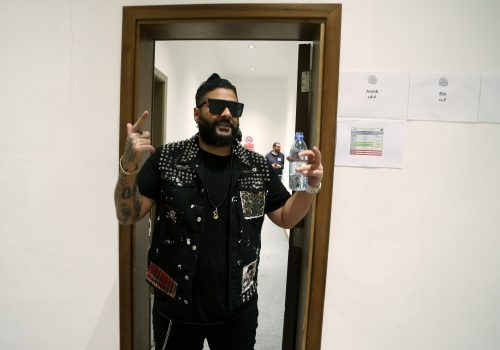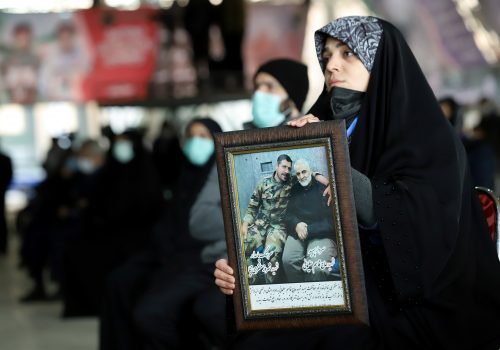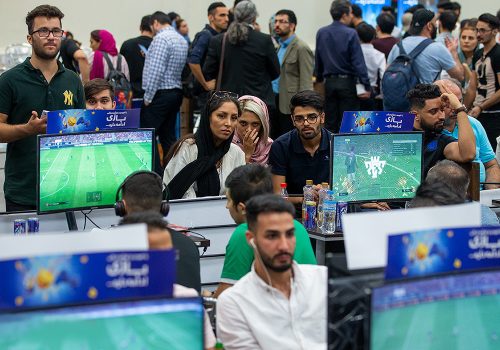An Iranian cleric, rights activist, and hacker entered a room—on Clubhouse
A member of the Khomeini clan, a women’s rights activist, and a hacker enter a room. It sounds like the beginning of a joke but in reality, that’s what happened recently in a Clubhouse chatroom discussing whether or not the hijab should remain mandatory in Iran.
Ahmad Khomeini, the 22-year-old great-grandson of the founder of the Islamic Republic, is one of a growing number of members of the Iranian political elite joining the trendy invitation-only audio chat app, which has surged in popularity since mid-February among Iranians inside Iran and the diaspora.
Iranians have gathered at this global café to countdown Nowruz, the Persian new year on March 20; to discuss the sudden death of a state media anchor; to do poetry readings, sing and play musical instruments; to share personal stories about first loves and depression; to debate whether Iran is or isn’t a client state of China after the two countries signed a 25-year strategic accord.
Another common chatroom theme is the upcoming presidential elections in June. Officials and politicians—including two potential candidates Information and Communications Technology (ICT) Minister Mohammad-Javad Azari Jahromi and former Islamic Revolutionary Guard Corps commander and minister Rostam Ghasemi—often join or lead the discussions, directly engaging the public in ways not seen before.
The rooms, which pop-up at least twice a day, cover an array of issues related to the June 18 vote. Iranians speak candidly about who might run—Foreign Minister Mohammad Javad Zarif and Judiciary Chief Ebrahim Raisi are among those mentioned—and why potential contenders are or aren’t qualified for the presidency. More times than not, someone openly declares the election is meaningless and that they’re fed up with the political system and want the clerical establishment gone.
In the audience is a motley crew including advocates of overthrowing the Islamic Republic, activists of various stripes, and analysts and journalists inside and outside the country, listening or participating in what can sometimes be a passionate debate with over one thousand in the room.
How long this relative free speech atmosphere will last is unclear.
Other countries in the Middle East are already pushing back against Clubhouse. In Oman, the app was banned for not having a “proper license.” In the United Arab Emirates, there have been reports of internet throttling, making it hard to access the app. Egyptian state television reported the application is a place for “terrorists” to gather—referring to the banned Muslim Brotherhood. There have also been reports of intimidation in Saudi chatrooms, perhaps a sign of things to come in Iran, where participants are threatened with naming and shaming, and conversations are screen-recorded and posted on Twitter.
So far, in the Persian language media, there have only been written and video explainers on how the app works, meaning it hasn’t gone mainstream in Iran—yet. Clubhouse has the potential to get citizens more politically engaged and spark larger public debates on hot button issues, but like all social media in Iran, it’s only a matter of time before authorities see it as a national security threat and ban the audio-only app.
After the 2009 post-election protests known as the Green Movement, social media—such as Facebook, YouTube, and Twitter—were blocked, forcing Iranians to resort to accessing them via Virtual Private Networks (VPNs). In 2018, the popular messaging app Telegram was also banned after a popular channel played a role in helping coordinate protests that occurred from December 2017 to January 2018. Lately, there’s been an ongoing debate about whether Instagram should be banned, which, if happens, will be under Jahromi’s watch. The ICT minister was partly responsible for a November 2019 internet shutdown during nationwide protests in which security forces arrested and killed thousands.
Clubhouse is only available for the iPhone. It has a relatively limited reach with 10 to 15 percent of the country’s 128 million mobile subscribers reportedly iPhone users. However, according to Mahsa Alimardani, an Iran researcher at the freedom of expression organization, ARTICLE19, “Developers have created a fork of Clubhouse for Android users who cannot access the app without an iOS device.” This unofficial Android version of Clubhouse by an Iranian developer has already been downloaded over 20,000 times.
There are already numerous security concerns about how Clubhouse deals with user data such as its open access to contacts and whether the tech company that powers the app—which happens to be Chinese—is sharing information with China. But for people living under repressive governments like Iran’s, there is an added layer of security concerns.
One reason for the popularity of Clubhouse is that its format is reminiscent of the call-in programs of Iranian diaspora satellite channels. While there was anonymity on those programs—with the callers and phone numbers not revealed—on Clubhouse, this is not the case. Users have to register with their phone number and use their real name—per Clubhouse community guidelines.
Alimardani says that some Iranians are using burner accounts to hide their identities, but not all are so vigilant. For example, in a room with an anti-clerical title, some participants inside Iran railed against the Islamic Republic, knowing full well the dangers of being so outspoken. When the moderator warned about their safety, one replied along the lines of “So what?” The heated debate then continued.
“There needs to be much done, both in terms of at the platform end—namely the problems of their phone number system—to create more privacy precautions for users, and on the user end, to have awareness of their security and safety online,” explains Alimardani.
Analysts have compared the Clubhouse mood to Twitter a decade ago before cyber troll armies and bots roamed social media. That’s not to say this social experiment has unrolled smoothly. Some moderators hog the mic or kick speakers that they disagree with off panels. Others go so far as blocking, making it impossible to enter a room if the blocker is present. Conspiracy theories spread with no accountability and echo chambers are formed. A moderator of a popular Persian language room was suspended from his job after allegations of sexual harassment were brought to light in said room. But there are also Iranians who choose to break the trend and have a discussion, even if they are fundamentally on the opposite sides of the debate—something that has become increasingly rare on social media these days, whether among Iranians or Americans.
Back in the room discussing mandatory hijab, some speakers—including a prominent women’s rights activist—tried to rally Khomeini to help change the law. After all, the young cleric’s great grandfather, Ayatollah Ruhollah Khomeini, forcibly imposed the rule 42 years ago. Cornered, Khomeini quickly distanced himself, saying he has not “decided” on whether he is for or against compulsory hijab—a prudent answer given the journalists in the audience.
Holly Dagres is editor of the Atlantic Council’s IranSource blog, and a nonresident senior fellow with the Middle East Programs. She also curates The Iranist newsletter. Follow her on Twitter: @hdagres.
Image: A man checks his mobile phone at a sidewalk in Tehran February 20, 2016. REUTERS/Raheb Homavandi/TIMA


